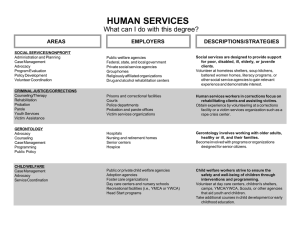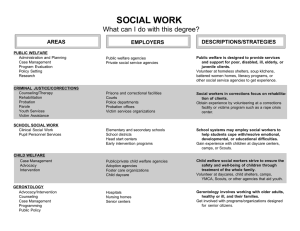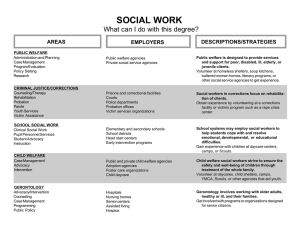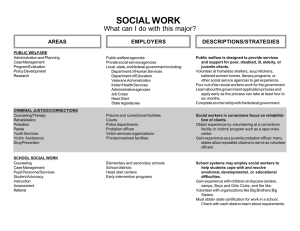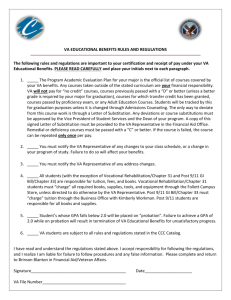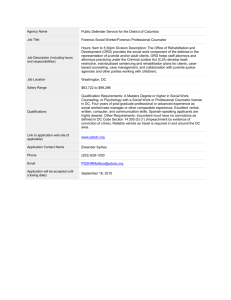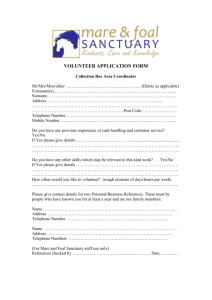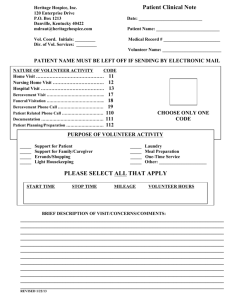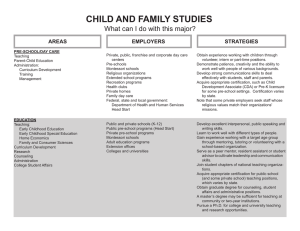HUMAN SERVICES What can I do with this major? AREAS EMPLOYERS
advertisement
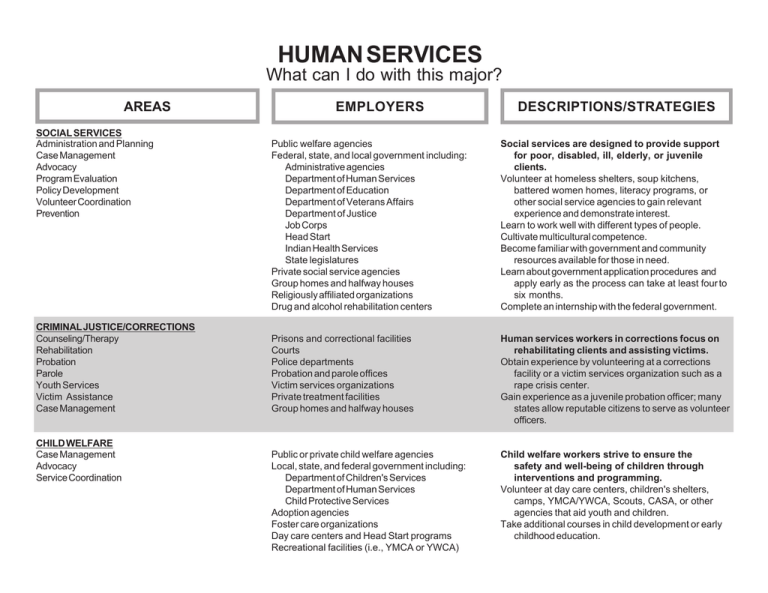
HUMAN SERVICES What can I do with this major? AREAS SOCIAL SERVICES Administration and Planning Case Management Advocacy Program Evaluation Policy Development Volunteer Coordination Prevention CRIMINAL JUSTICE/CORRECTIONS Counseling/Therapy Rehabilitation Probation Parole Youth Services Victim Assistance Case Management CHILD WELFARE Case Management Advocacy Service Coordination EMPLOYERS DESCRIPTIONS/STRATEGIES Public welfare agencies Federal, state, and local government including: Administrative agencies Department of Human Services Department of Education Department of Veterans Affairs Department of Justice Job Corps Head Start Indian Health Services State legislatures Private social service agencies Group homes and halfway houses Religiously affiliated organizations Drug and alcohol rehabilitation centers Social services are designed to provide support for poor, disabled, ill, elderly, or juvenile clients. Volunteer at homeless shelters, soup kitchens, battered women homes, literacy programs, or other social service agencies to gain relevant experience and demonstrate interest. Learn to work well with different types of people. Cultivate multicultural competence. Become familiar with government and community resources available for those in need. Learn about government application procedures and apply early as the process can take at least four to six months. Complete an internship with the federal government. Prisons and correctional facilities Courts Police departments Probation and parole offices Victim services organizations Private treatment facilities Group homes and halfway houses Human services workers in corrections focus on rehabilitating clients and assisting victims. Obtain experience by volunteering at a corrections facility or a victim services organization such as a rape crisis center. Gain experience as a juvenile probation officer; many states allow reputable citizens to serve as volunteer officers. Public or private child welfare agencies Local, state, and federal government including: Department of Children's Services Department of Human Services Child Protective Services Adoption agencies Foster care organizations Day care centers and Head Start programs Recreational facilities (i.e., YMCA or YWCA) Child welfare workers strive to ensure the safety and well-being of children through interventions and programming. Volunteer at day care centers, children's shelters, camps, YMCA/YWCA, Scouts, CASA, or other agencies that aid youth and children. Take additional courses in child development or early childhood education. (Human Services, Page 2) AREAS DEVELOPMENTAL DISABILITIES Case Management Advocacy Program Planning and Evaluation Policy Development Rehabilitation Research GERONTOLOGY Advocacy Administration Counseling Case Management Programming Public Policy HEALTH CARE Case Management Counseling Program Development Administration Rehabilitation Prevention Education Research Hospice Care EMPLOYERS DESCRIPTIONS/STRATEGIES Community residential homes State and local agencies including: Vocational Rehabilitation & Employment programs One-stop career centers Medical facilities Mental health organizations Schools Colleges and universities Employment agencies Human services workers specializing in this area help people with disabilities to adjust to and lead productive lives. Volunteer at special needs camps, child care centers, schools, or hospitals to gain experience. Learn about a variety of disabilities and accomodations. Obtain specialized training in areas such as sign language or assistive technology for additional opportunities. Earn a master's degree in rehabilitation counseling for opportunities in vocational rehabilitation. Hospitals Nursing and retirement homes Senior centers Assisted living facilities Hospice Home healthcare agencies Community agencies serving the elderly Gerontology involves working with older adults, healthy or ill, and their families. Become involved with programs or organizations designed for senior citizens. Join the American Society on Aging. Supplement curriculum with course work in life span development and aging. Obtain specialized training and credentials oriented toward gerontology. Hospitals Health maintenance organizations (HMOs) Nursing homes Hospice programs Home healthcare agencies Community health centers Public health programs Social service organizations Outpatient clinics Group homes Specialized camps/schools Federal, state, and local government including: Department of Health and Human Services Department of Veterans Affairs Human services workers in healthcare facilitate the medical and emotional treatment of patients. Volunteer in health related settings such as hospitals or the American Red Cross to gain experience. Supplement curriculum with course work in public health or community health education. Gain membership in relevant professional associations. Become familiar with community resources. (Human Services, Page 3) AREAS ADMINISTRATION Management Policy Development Planning Supervision Fundraising Budgeting Grant Writing BUSINESS AND INDUSTRY Human Resources Management Market Research Customer Service Sales Public Relations Corporate Giving Development Employee Assistance Programs Financial Counseling EMPLOYERS DESCRIPTIONS/STRATEGIES Social service agencies Employee assistance programs Probation departments Public interest groups Local, state, and federal government including: Department of Human Services Department of Children's Services Department of Education Department of Justice Department of Veterans Affairs State mental health departments Job Corps Head Start Public welfare agencies Residential or outpatient hospitals/treatment centers Administrators are involved with planning, budgeting, public relations, management, fund raising, and other crucial operating responsibilities that keep an organization functioning. Supplement curriculum with course work in areas such as public relations, advertising, accounting, or management. Consider earning a business minor. Obtain a master's degree in social work or related field for additional opportunities. Gain management experience through internships, part-time employment, or leadership in relevant student organizations. Research government application procedures. Business firms in various industries Developers of educational products National foundations and associations Consumer protection agencies Social service organizations with business components, i.e. tax assistance, financial planning Graduates of human services programs may apply their skills and knowledge in the private sector of business and industry. Earn a minor in business or related field. Develop computer skills particularly with spreadsheets, databases, word processing, and desk top publishing. Learn to communicate effectively with a wide range of people. Take courses to enhance writing skills. Gain experience through part-time jobs, summer jobs, and internships in business environments. Get involved in student organizations and seek leadership roles. (Human Services, Page 4) GENERAL INFORMATION • A bachelor's degree in human services prepares individuals for entry-level positions in the helping professions. • A master's degree in counseling, social work, occupational therapy, or related field, in addition to appropriate professional licensure, is usually necessary to provide therapy and for advancement to supervisory or administrative positions. • Complete practicum experiences and internships to determine suitability for the helping professions and to gain exposure to various practice settings and clients. • Candidates should possess empathy for others, an appreciation for diversity, and an interest in social change. • Gain experience with a wide range of clients and client systems including individuals, families, groups, communities, and minorities. • Join a human service organization while in school and seek leadership positions. • Look for ways to impact your community and get involved with local organizations and issues. • Become familiar with local social service agencies and resources available for those in need. • Learn a second language to better communicate with diverse client populations. • Develop ability to work well under pressure and manage stress. • Update your resume as you acquire new accomplishments, skills, knowledge, and interests. © 2000 The University of Tennessee Prepared by the Career Planning staff of Career Services at The University of Tennessee, Knoxville. (2000, revised 2004, 2009) UTK is an EEO/AA/Title VI/Title IX/Section 504/ADA/ADEA Employer
